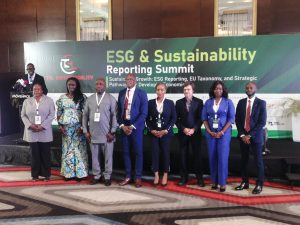Africa Union Calls for Unified Funding Framework for Sustainability

A Call for Unified Development Frameworks in Africa
The African Union has been urged to integrate its various developmental frameworks into a single, continent-wide system. This initiative aims to ensure affordable and sustainable financing across the continent. The call was made by Engineer Seth Mahu, Director of Renewable Energy at the Ministry of Energy and Green Transition, during the opening of the first Africa Global ESG and Sustainability Reporting Summit in Accra on Monday.
Speaking on behalf of President John Dramani Mahama, Mahu emphasized that while the African Union has not yet established a unified framework like the European Union’s model, Agenda 2063 has laid the groundwork. He highlighted the importance of consolidating these frameworks to align with the continent’s standards and improve access to long-term funding. “Bringing these plans together would match African standards and make it easier to access long-term funding,” he said.
Key Objectives of the Summit
The summit, organized by TSL Sustainability in collaboration with several ministries including Energy and Green Transition, Environment, Science and Technology, and Lands and Natural Resources, focuses on ESG reporting frameworks and strategic pathways for developing economies. It brings together sustainability professionals, policymakers, researchers, and development partners to address critical challenges related to climate change, energy transition, and sustainable finance.
Mahu outlined the country's efforts to develop a national plan for ESG and climate reporting. This initiative aims to standardize sustainability practices across different industries. He also mentioned the government’s preparation of an investment plan for energy transition and a sustainable finance framework to guide investments and combat greenwashing. Additionally, a major support package for green transition is being developed to assist areas such as health, education, and industry.
Importance of Capacity Building and Data Infrastructure
Mahu stressed the need for capacity development and investment in data infrastructure to equip all stakeholders for effective ESG implementation. He noted that the country is progressing in renewable energy and nuclear power, ensuring that everyone has access to energy.
Dr. Shelter Lotsu, Founder and CEO of TSL Sustainability, emphasized the need for mandatory ESG reporting. He pointed out that although the Ghana Stock Exchange has introduced ESG guidelines, they are not mandatory, which hinders responsible investment. He encouraged government ministries to collaborate and leverage global sustainable investment funds.
Environmental Risk Management and National Data Systems
Professor Nana Ama Browne Klutse, CEO of the Environmental Protection Authority, spoke on behalf of the late Minister for Environment, Science, Technology, and Innovation. She outlined the ministry’s commitment to incorporating environmental risk management into business activities and creating reliable national data systems for ESG. She also highlighted the need to adapt global reporting standards to the country’s specific situation.
Future Directions and Policy Recommendations
The summit aims to produce policy suggestions, training programs, and a push for required ESG reporting in the country. Over the next two days, participants will continue discussions focusing on adapting international frameworks to local needs and finding workable ideas for sustainable development. These efforts are crucial in shaping a future where Africa can effectively harness sustainable finance and achieve long-term economic growth.

Comments
Post a Comment